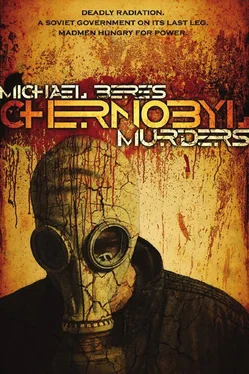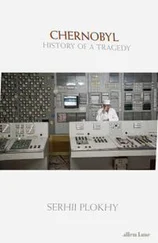Michael Beres - Chernobyl Murders
Здесь есть возможность читать онлайн «Michael Beres - Chernobyl Murders» весь текст электронной книги совершенно бесплатно (целиком полную версию без сокращений). В некоторых случаях можно слушать аудио, скачать через торрент в формате fb2 и присутствует краткое содержание. Жанр: Триллер, на английском языке. Описание произведения, (предисловие) а так же отзывы посетителей доступны на портале библиотеки ЛибКат.
- Название:Chernobyl Murders
- Автор:
- Жанр:
- Год:неизвестен
- ISBN:нет данных
- Рейтинг книги:4 / 5. Голосов: 1
-
Избранное:Добавить в избранное
- Отзывы:
-
Ваша оценка:
- 80
- 1
- 2
- 3
- 4
- 5
Chernobyl Murders: краткое содержание, описание и аннотация
Предлагаем к чтению аннотацию, описание, краткое содержание или предисловие (зависит от того, что написал сам автор книги «Chernobyl Murders»). Если вы не нашли необходимую информацию о книге — напишите в комментариях, мы постараемся отыскать её.
Chernobyl Murders — читать онлайн бесплатно полную книгу (весь текст) целиком
Ниже представлен текст книги, разбитый по страницам. Система сохранения места последней прочитанной страницы, позволяет с удобством читать онлайн бесплатно книгу «Chernobyl Murders», без необходимости каждый раз заново искать на чём Вы остановились. Поставьте закладку, и сможете в любой момент перейти на страницу, на которой закончили чтение.
Интервал:
Закладка:
Back at the roadside emergency headquarters, another convoy of trucks and buses roared past, heading north, their headlights flashing on the sides of the tents.
The traffic heading southwest increased. To stay on the main route, Vasily simply followed the lights of the car ahead. Likewise, the car behind stayed close, and Juli used this light to look into her dosimeter.
Vasily’s fifteen-year-old sister was named Lena. While Vasily’s mother slept at the other end of the back seat, Lena, who sat between her mother and Juli, asked questions as they drove through the night.
“What does it say now?” asked Lena.
“About a hundred,” said Juli.
“I learned in school radiation is more dangerous for younger people.”
“Don’t worry, Lena. They’ll have doctors in Kiev to check everyone. People get a hundred millirems in a year from natural radiation. My dosimeter goes all the way up to three hundred, and we turn it in every day.”
“Aren’t you worried for your baby? A baby shouldn’t get any.”
“Juli’s been taking precautions,” said Marina from the front seat.
“Like what?” asked Lena.
“Quit being so depressing,” said Vasily. “We’re out of there, and we can do nothing about what’s already happened.”
“I was simply asking, Vas. Anyway, you pay attention to driving.”
“I will,” said Vasily. “But when we get where we’re going, I might have to pop you.”
Lena laughed, changed the subject, and began talking about her friends at school. No one complained about Lena’s talking. There was nothing but somber music on the radio, and the talk of a teenaged girl made the darkness outside less frightening.
“Look,” said Lena. “There’s a bus parked at the side of the road.”
Someone waved a flashlight around as two women squatted behind sparse bushes.
“The men are farther ahead at another bush,” said Vasily. “See them standing in the dark? The bus driver picked this place for a toilet break because only plowed fields are ahead.”
“It’s depressing,” said Marina.
“People going to the toilet depresses you?” said Vasily.
“The entire situation,” said Marina. “All these people, their lives changed forever.” Marina spoke more quietly. “Especially the children. They’ll be frightened of rain and snow.”
“What will be left for us?” asked Lena.
Although Juli, too, felt discouraged, she tried to be positive.
“Nothing is irreversible. What mankind has done can be undone. I think of the radiation as simply another form of pollution. Science will provide answers… it must provide answers.”
Vasily braked hard as the cars ahead came to a stop. An army truck blocked the lane heading south, with soldiers outside waving the cars around it. Each car was stopped, a soldier leaning into the driver’s window.
“What is it?” asked Vasily, when his turn came.
“How many in the car, and where are you from?” demanded the soldier.
“There are five of us,” said Vasily. “We came from Pripyat.”
The soldier counted out slips of paper from a stack in his hand.
“Here are five temporary travel passes. Keep them with you at all times.”
“Do you have any information?” asked Vasily.
“Nothing. Drive to Kiev. You’ll be told where to go from there.”
The soldier waved for them to go and stepped back to the next car in line.
Vasily closed his window and drove on.
“Maybe it’s a good sign he didn’t have his mouth covered,” said Juli.
“We’ll probably be able to enjoy the May Day parade in Kiev,” said Marina.
“Enjoying the parade will be impossible,” said Lena. “How can all these people even fit into Kiev? What about the people already there? Look at the cars coming from the side road. Even more people. How will anyone be able to tell all of us where to go and what to do?”
No one in the car answered Lena’s questions. But everyone, even Vasily’s mother, who was now awake, stared across farm fields at a line of cars and buses from the northeast waiting to get on the main road south. Ahead, at the crossroads, flares were lit, and soldiers directed traffic.
When the line of traffic passed through the town of Korosten, soldiers on both sides with flashlights waved everyone through, making them turn southeast. Near midnight, at a sign saying Kiev was ten kilometers away, traffic slowed to a crawl.
“I told you,” said Vasily’s mother. “We should have gone to my older brother’s farm.”
“We’ve already discussed it!” shouted Vasily. “His farm is too close to Chernobyl. Juli needs to get to her aunt’s house in Visenka, the most direct way there is through Kiev, and we’ll all be better off in Kiev.”
“All right, Vasily. I put my trust in you, and in God. My younger brother is on a collective south of Kiev. If they have room, maybe we’ll end up there.”
After Korosten, the road widened. Very little traffic headed northwest, mostly army vehicles and empty buses. They were in the lane nearest the side of the road. Occasionally, when a car or bus with open windows came alongside, Vasily lowered his window to see if he could get some news. Others were also trying to get news, and it seemed no one knew much. The Chernobyl plant had exploded, radiation had been released, and the area was being evacuated. But no one knew when they would be allowed to go back to their homes.
Eventually traffic stopped completely, and Vasily turned off the engine to conserve gas. With engines off, they could hear conversation in the bus next to them. The bus windows were open, people inside saying it was hot with so many people onboard. A few men on the bus smoked cigarettes, blowing smoke out the windows. Others stepped outside to smoke, and also to share a swig from a bottle hidden beneath a coat. The talk among women concerned the children. Several mentioned the iodine pills handed out at school the day before, and Juli wondered if they had some on the bus, a spare pill or two for her baby. Two men came to the window and told Vasily the outskirts of the city and the checkpoint were only a few kilometers away. The men said they were going to walk ahead to see what they could find out.
Juli was going to the town of Visenka, beyond Kiev. Vasily’s mother had relatives on farms around Kiev. It would be a waste of time for them to drive all the way to Visenka simply to drop her off at her aunt’s.
“Marina, I’ve made up my mind.”
“About what?” asked Marina.
“I’m going to walk,” said Juli, pulling her small bag from the floor.
“You can’t walk.”
“Why not? I’ll stay over at a hotel and tomorrow take a taxi or the metro to Aunt Magda’s. This way you can decide on your destination without worrying about me. I’ve got a place to stay. I can take care of myself. You need to take care of yourselves. Don’t argue with me, Marina. Lots of people are walking.”
“But, Juli.”
“She’s right,” said Vasily. “If we go through Kiev and try to get back in from the other side, we might get stuck.”
Juli opened her door and got out. “At the checkpoint my having a different destination would only complicate things.”
“Are you sure you’ll be all right?” asked Marina.
“My aunt’s expecting me,” said Juli. “I’ve been watching the dosimeter, and it’s fine now. It’s time to go.”
Marina got out of the car, ran around to the other side, and hugged Juli.
“You’re like a sister to me,” said Juli.
“You are my sister,” said Marina.
After Marina got back in the car, Juli began walking, and soon others came from cars and buses to join her, heading for the flashing lights of militia vehicles in the distance. The sounds of engines and voices and shuffling feet, along with the smell of dust in the night air, reminded her of a night long ago in Moscow when her father took her to the circus. Back then, people lined up to get in to see performers and animals. Here, people were the animals as they bumped against one another like livestock.
Читать дальшеИнтервал:
Закладка:
Похожие книги на «Chernobyl Murders»
Представляем Вашему вниманию похожие книги на «Chernobyl Murders» списком для выбора. Мы отобрали схожую по названию и смыслу литературу в надежде предоставить читателям больше вариантов отыскать новые, интересные, ещё непрочитанные произведения.
Обсуждение, отзывы о книге «Chernobyl Murders» и просто собственные мнения читателей. Оставьте ваши комментарии, напишите, что Вы думаете о произведении, его смысле или главных героях. Укажите что конкретно понравилось, а что нет, и почему Вы так считаете.












